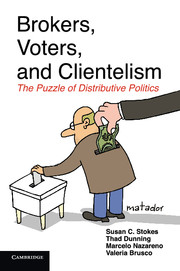Book contents
- Frontmatter
- Dedication
- Contents
- List of Tables
- List of Figures
- Preface and Acknowledgments
- I MODALITIES OF DISTRIBUTIVE POLITICS
- II THE MICRO-LOGIC OF CLIENTELISM
- III THE MACRO-LOGIC OF VOTE BUYING: WHAT EXPLAINS THE RISE AND DECLINE OF POLITICAL MACHINES?
- IV CLIENTELISM AND DEMOCRATIC THEORY
- Appendix A: Argentina Brokers' Survey
- Appendix B: Argentina Voters' Surveys
- Appendix C: Venezuela Voters' Survey and the Maisanta Database
- Appendix D: India Voters' Survey
- References
- Index
- Miscellaneous Endmatter
Appendix A: Argentina Brokers' Survey
Published online by Cambridge University Press: 05 June 2014
- Frontmatter
- Dedication
- Contents
- List of Tables
- List of Figures
- Preface and Acknowledgments
- I MODALITIES OF DISTRIBUTIVE POLITICS
- II THE MICRO-LOGIC OF CLIENTELISM
- III THE MACRO-LOGIC OF VOTE BUYING: WHAT EXPLAINS THE RISE AND DECLINE OF POLITICAL MACHINES?
- IV CLIENTELISM AND DEMOCRATIC THEORY
- Appendix A: Argentina Brokers' Survey
- Appendix B: Argentina Voters' Surveys
- Appendix C: Venezuela Voters' Survey and the Maisanta Database
- Appendix D: India Voters' Survey
- References
- Index
- Miscellaneous Endmatter
Summary
To gather fine-grained information about the preferences and behaviors of political brokers, we surveyed elected city councilors and non-elected activists who work for those councilors in the Argentine provinces of Córdoba, San Luis, and Misiones, as well as the Conurbano area of greater Buenos Aires. In this book, we refer to both councilors and non-elected activists as “brokers.” This is appropriate, as councilors may work as operatives for mayors or other politicians at higher levels of the political system, whereas many councilors also had worked as neighborhood operatives before rising to elected office. The non-elected activists we surveyed, meanwhile, work directly as political operatives for councilors. We therefore believe that both elected councilors and their non-elected operatives should be considered local brokers. Surveying them gives us important insights into their preferences and behaviors.
The major difficulty involved in surveying brokers involves how to generate a representative sample. Previous researchers working in Argentina, such as Auyero and Levitsky, have generated valuable insights into the political function and behaviors of brokers. Yet it is difficult to know how results from these convenience samples may or may not extend to the many tens of thousands of political operatives who comprise the population of interest. Generating a probability sample of these operatives is challenging, however, because a readymade sampling frame – that is, a list of brokers from which one could draw a random sample – does not exist.
- Type
- Chapter
- Information
- Brokers, Voters, and ClientelismThe Puzzle of Distributive Politics, pp. 261 - 278Publisher: Cambridge University PressPrint publication year: 2013
- 1
- Cited by



